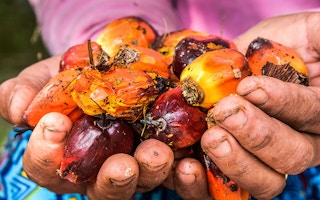Goodhope Asia Holdings has issued a new sustainability policy, committing the palm oil giant to stop clearing forests and peatlands.
The Singapore-based firm was already a member of the Roundtable on Sustainable Palm Oil, the world’s largest association for ethical production of the commodity, found in everything from chocolate to laundry detergent.
Companies that join the RSPO are prohibited from clearing virgin rainforests and deep peatlands, allowing them to promote their products with the body’s green label.
But last week, the RSPO froze Goodhope’s operations on seven concessions in Indonesia. The company had been linked to various cases of environmental and human rights abuses in the archipelago country, including allegations of grabbing land from an indigenous community in Papua province, on the heavily forested island of New Guinea, where the industry is quickly expanding.
The RSPO is often assailed for keeping minimal standards and for failing to enforce even those. For example, no public notification of the new planting plans of Goodhope subsidiary PT Nabire Baru were posted to the RSPO’s website until last March, even though the company had been clearing and planting for years amid protests from local communities.
Under the RSPO’s New Plantings Procedure, companies must submit a variety of documentation prior to to any establishment or expansion of a plantation. But like many of the RSPO’s rules — and, for that matter, like many of the Indonesian government’s regulations in the natural resources sector — the requirement is commonly ignored, with few if any consequences.
But the RSPO’s stop-work order against Goodhope met with approval from environmental watchdogs who lauded it as the kind of thing the body must do if it wants to be perceived as credible.
It remains to be seen how the company, which said it opposed the RSPO’s decision, will undertake to resolve the issues in concessions like Nabire Baru, described by watchdog awas MIFEE as “possibly the most controversial plantation in Papua.”
The case was also examined by Indonesia’s National Commission on Human Rights as part of an inquiry into land conflicts affecting indigenous peoples.
Goodhope’s new policy to purge its supply chain of deforestation and peatland conversion might prove a positive development — if the company can implement it.
Other large palm oil firms, including most major refiners and users of the edible oil, have issued similar commitments, but none has managed to even determine where all of the palm oil it buys is coming from.
“Full traceability” to the plantation level, as it is known in industry parlance, is a mainstay of such commitments, seen as an early prerequisite before any company that touches palm oil can declare itself free from the taint of destructive and abusive practices.
Goodhope has set for itself the date of May 4, 2019, as its deadline for achieving full traceability.
This story was published with permission from Mongabay.com










